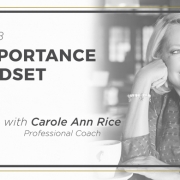From Riding The Bench To Starting The Game–A 10-Point Plan
 I hear this a lot in business. People want to start in the game for their company…yet their boss keeps them “on the bench.” They may want to get access to the larger account…or make more money…or get more responsibility…or get that promotion. Whatever “starting” means to you is fine.
I hear this a lot in business. People want to start in the game for their company…yet their boss keeps them “on the bench.” They may want to get access to the larger account…or make more money…or get more responsibility…or get that promotion. Whatever “starting” means to you is fine.
But, it amazes me how most people go to their manager with a demand: “Play me!”
Think about the arrogance of that. Instead, it seems to me that if someone is riding the bench and wants to start they must realize some facts. (I write this in sports analogy—and if you have a son/daughter who is not getting as much “playing time” as they’d like, give this to them. It all applies.)
- Most coaches believe that who they’re playing is in the team’s best interest. Even if they aren’t playing the best people, they have a reason—and that becomes their belief. (Resist thinking there is some conspiracy theory to keep you on the bench.)
- Every team has VOIDS in their line-ups that need filling. No team is perfect. Sports teams have voids all the time. Sometimes you have to look for them.
- That to play, the coach must see you as a bigger contributor in the lineup than the players he currently has in. Pretty simple concept, but one that is missed frequently.
- Make the coach HAVE to play you because it’s in his best interest. Make him “look like a fool” NOT to put you in. We’ll talk about HOW to do that later. If you’re just trying to be “as good as” everyone else, you’ll probably not break thru…unless you have some other value to bring.
- Demanding playing time NEVER works. It creates resentment and a high drama situation that the coach/manager will resist. Don’t make the mistake of seeing the coach as the enemy.
- Focus on MAKING THE TEAM BETTER. Don’t make this about YOU. It’s easy to fall into this trap. As you follow the plan below, you’ll find that not only will you make the TEAM better, but you’ll also play more as a result.
Consequently, here is a 10-point plan you can use on your team or in your business:
- Have a goal to “start” by a certain time frame. Make it realistic, but your mind must have something that it works toward. Don’t quit if you aren’t starting by then, but see if you’ve made progress. Our mind loves goals—and dates. It crystallizes what needs to be done, and creates momentum. Make this a private goal. Don’t go blabbing it about.
- Keep a mentor and a journal. Find someone you can talk to about it. Not a parent…but a mentor of some kind. Line up some people who are “rooting for you.” Share and write your feelings. You’ll begin to see that you string together positive days and your results get better—and you get closer to your goal. A mentor will help you “pull focus” so you aren’t so close to it.
- Identify the VOIDS that your team has. This could be on-floor leadership, ability to finish a play, better movement, better technique. Every team has voids. Sometimes the coach doesn’t even see it UNTIL you have your meeting with him and ask him (#5). But if you can be a void-filler—or problem-solver for your coach or manager—you instantly become more valuable.
- Study the game so you can become better. Look at YouTube videos, read books, listen to clips, talk to other coaches. Do ALL you can to study the game so you become more valuable ON the floor. Being a student of the game you’re playing will naturally lead you to better on-court skills. (We see that very few people today want to spend the time to become a “student of their game.” Instead, they just figure if they show up to practice enough times, they’re entitled to game time. Not so. Showing up ain’t good enough. Better to be “indispensable.”)
- Have a conversation with the coach—tell him your plans. Tell him you want to contribute the best you can. Sitting the bench and whining about not playing is NOT what you will do. BUT you will be changing rapidly and becoming more involved in leadership. Be clear to the coach that this conversation is NOT ABOUT GETTING MORE PLAYING TIME ALONE…it is to be informed by him/her on “How I can contribute at a higher level than I currently am?”
- Identify the skills that you need to work on. Skills are the secret in competitive sports/business. Do you need to jump higher? Move quicker? Be more aggressive? Communicate more? As you have the meeting with your coach, seek his opinions too. By working on those skills, you make your team better. (This is where high achievers shine. They know that it’s about their skills—not about someone else’s (coach) plan for them.
- Detach from outcome. The more desperate and attached you get, the harder it will be to be resilient and flexible. You can want something too much. Keep everything in perspective. Make it a game within yourself. Then, when you accomplish your goal, people will marvel at you. And you can just tell them, “Aw, it was nothing.” Undoubtedly, whatever this means in your life, you must keep it in context. Don’t make it bigger than it really is. All of life/business is just a game.
- Get to the gym early. Let them see that this is more than mere words to you. That you’re trying…not sulking. Stretch more. Do some strengthening exercises. Do things that will improve your skills. Do the Larry Bird Routine (get to the gym one hour earlier and leave one hour later than everyone else). (See #5)
- Redirect your negative energy. If you find yourself being resentful toward the coach or another player that you feel is getting preferential treatment, channel that frustration toward a workout. People are put in our lives for us to become better. Would Pete Sampras have been as good as he was without Andre Agassi? Would Roger Federer be as good as he is without Rafael Nadal? Answer to both? No. Negative energy is actually quite positive…because it means you have passion for improvement.
- Laugh. Sports and business should be joyful. Not drudgery. But walk into most offices and listen for laughter. Not much of it, is there? Keep the joy of a beginner.




